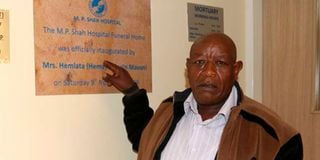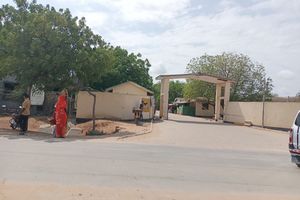Andrew Njoroge: Inside my 14, 600 days with the dead

Andrew Njuguna, a former mortuary attendant at M.P. Shah Hospital, Nairobi during the interview on March 8.
What you need to know:
- The topic of death is always avoided and remains a closed discourse, a taboo surrounded by mystery.
- However, for Andrew Njuguna, who has worked in a mortuary for 40 years, death is just a biological process of the human body which every soul must taste.
On the night of death, sorrow engulfs families. People start thinking about their last day on Earth.
To many, it can be the unwanted departure from a world that is full of life, but to others it can feel like a relief at the end of a long, rewarding journey or the cold unknown from which their dreams recoil.
But the topic of death is always avoided and remains a closed discourse, a taboo surrounded by mystery.
However, for Andrew Njuguna, who has worked in a mortuary for 40 years, death is just a biological process of the human body which every soul must taste.
Many people believe death is scary; others say it is punitive, while some say it is downright despicable, but for Andrew, 60, working as a mortician was a fulfilling job though nobody desires to walk through piles of corpses every day.
Until he retired recently, for 14,600 days, Mzee Andrew lived with the dead as a mortuary attendant at Nairobi’s MP Shah Hospital.
When Healthy Nation visited him, he shared the myths, realities and challenges of living with the dead.
Growing up on the slopes of Kihumbuini, Murang'a County, Andrew never thought of even working in a hospital, let alone in a morgue.
While he was in Form Two, he was forced to drop out of school due to lack of fees. He started working at a local garage in Murang'a town as a mechanic.
"I would leave the house a very clean man but in the evening I would return very dirty because of the work at the garage, this I did not like at all and so I quit," he recalls.
He went looking for menial jobs and as luck would have it, he was called to fill in a vacancy as a casual worker at M.P. Shah Hospital.
"I worked as a casual labourer for one year and on July 11, 1981, I was officially employed and given a payroll number."
Since then, he worked in different departments — in the X-ray room, kitchen and wards.
It was while at the wards that he interacted with mortuary attendants.
When a patient died in the wards, Andrew and his co-workers would help the nurses transfer them to the hospital mortuary.
After a while, a vacancy arose in the morgue following the retirement of one of the attendants.
Andrew applied and got the job. Unlike at the wards where he would pack the bodies, he was taught everything about taking care of corpses once at the mortuary.
A hospital mortuary attendant admits bodies from other hospital floors after death has been pronounced by a physician and confirms the body's identity by comparing the hospital wristband to the hospital chart.
According to Andrew, when a corpse is brought in, they just don't put them in the storage unit. They go through the embalming process.
"Embalming a body is meant to slow down the decaying process. When a body is brought in, we drain its fluid.
“This is done by introducing specialist embalming solutions into the body after someone has passed away, helping to give them a peaceful appearance.”
However, the embalmment is done only when there is a burial permit from the family members.
"You have to be very careful while handling the corpses. Sometimes there might be disputes between the family members, with one wanting to bury the body immediately while the other might insist on a post-mortem.
“When you embalm the corpse , the post-mortem will not show anything even if there was poison in the body, thus tempering with it. This might land you in the wrong hands of the law,” he says.
His job has not been easy; he has been a part of numerous emotional moments and has shed more tears than he can remember.
He has been with families in the grieving process — for many, it's a scary experience even being around a mortuary, but he has found a way to make it easier for the grieving families.
“Here you have to put yourself in the shoes of those grieving,. When they come to check or pick the body I have to be there for them,” he says.
“I will cry with them, pray with them and even view the body with them just to show them I am with them through this journey. Once they are ready to view the body, I give them enough time with their loved ones."
In the four decades he had been working there, the Westgate attack that left 67 people dead had a toil on his mental wellbeing.
Also Read: 'Gravedigger' who wants to be president
He had to handle bodies with gun wounds and work for seven days concurrently.
"Many of those people killed at Westgate were brought to us; the bodies were damaged with gun wounds. We had to reconstruct the damaged bodies before family members arrived at the mortuary quickly.
“If there was a time I had a mental breakdown in my career, it was then. Just seeing lifeless bodies lying there because the morgue was full and bodies were still being brought there."
For the entire time he served at the mortuary, only one person came back to thank him for taking care of their loved one.
"I remember the wife of Bishop Dr Wilfred Lai came to say thank-you.”
Mzee says he has never experienced stigmatisation because of his work as everyone around him knew what he was doing for a living.
"Neighbours appreciate what I do because I help them too while I am at home. In one instance, a neighbour died at home and every member of his family was afraid to take him to the mortuary. So when the police were down with their report, I covered the body with a blanket, put it on my shoulder, put it in the police vehicle and took it to the City Mortuary," he narrates.
One of Mzee Andrew’s other roles was to transfer the bodies to the autopsy table, providing tools, equipment, and supplies as requested, and sealing and labelling collected tissue samples for transfer to the laboratory department.
"Working with the pathologists I learned a lot, I would even open up the body to check them. I would then stitch the body parts together again.”
Other procedures involve encoffing before doing the final presentation popularly known as cosmetology. The latter is beautification of the body, which is done only according to the family’s specifications.
When death may be related to a crime, collecting, labelling, documentation and disposition of all material obtained during the autopsy must be carefully and correctly recorded.
Myths that border on bizarre occurrences in morgues, especially the spine-chilling behaviours of corpses speaking from the storage racks as others sit upright on their deathbeds, are just blatant untruths, he says.
On his personal experiences, Andrew says he has never seen a dead body walk, nor has he communicated with their ghosts.
"That is just a myth because before this body is brought into the morgue, a physician must confirm that it's indeed dead. Secondly, the corpses are not moved immediately to the morgue. At M.P Shah, it was our practice to keep the body in the ward for over one and a half hours before transferring it to the mortuary. So I have never encountered a 'dead man' walk.
“Also, there is a common belief that the spirit of a dead person remains active long after he has stopped breathing and could continue to move about even after the body has been certified dead.”
Andrew says the mortuary is the most peaceful place to work as there is no one to push you around.
He affirms: "At the morgue, nobody bothers you. You just work with the dead, who will not question you."
As he retires to his rural home in Murang'a County, Mzee Andrew is sad that none of his many children are taking after him. . However, he is happy that they are creating their paths.
He hopes they will leave a mark in whatever they do, just as he did.
If he died today, would he like being handled the way he dealt with the many corpses that passed through his hands?
“Yes,” he says.





